Platonic Solids (Regular Solids, Regular Polyhedra)
Regular Solids
Regular solids (regular polyhedra, or Platonic solids which were described by Plato) are solid geometric figures, with identical regular polygons (such as squares) as their faces, and with the same number of faces meeting at every corner (vertex). Euclid proved that there are only five regular convex polyhedra.
The five Platonic Solids were thought to represent the five basic elements of the world; earth, air, fire, water, and the universe.
The “regular solids” are important in many aspects of chemistry, crystallography, and mineralogy.
- The equilateral triangle is the simplest regular polygon. Placing three equilateral triangles at a vertex (total angle 180°) will form a tetrahedron (4 faces, 4 vertices).
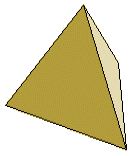 It has the smallest volume for its surface.
It has the smallest volume for its surface.
The tetrahedron represents fire. - Placing four equilateral triangles at each vertex (total angle 240&def;) will form an octahedron (8 faces, 6 vertices).
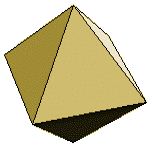 The octahedron rotates freely when held by its two opposite vertices and represents air.
The octahedron rotates freely when held by its two opposite vertices and represents air. - Placing five equilateral triangles at each vertex (300°) will form an icosahedron (20 faces and 12 vertices).
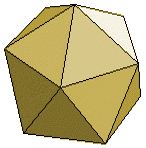 It has the largest volume for its surface area. The icosahedron represents water.
It has the largest volume for its surface area. The icosahedron represents water. - The second simplest regular polygon is the square. Placing three squares at each corner (270°) will form a cube, or hexahedron (6 faces and 8 vertices).
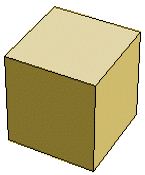 The hexahedron, standing firmly on its base, represents the stable earth.
The hexahedron, standing firmly on its base, represents the stable earth. - The third simplest regular polygon is the regular pentagon. Placing three pentagons at each vertex (324°) will form a dodecahedron (12 faces and 20 vertices).
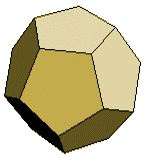 The dodecahedron represents to the universe since the twelve zodiac signs correspond to the twelve faces of the dodecahedron.
The dodecahedron represents to the universe since the twelve zodiac signs correspond to the twelve faces of the dodecahedron.
Tidbit of Info:
A soccer ball is composed of a combination of pentagon and hexagon faces. This shape is called a buckyball after Richard Buckminster Fuller, who invented the geodesic dome. In reality, the soccer ball is not truly a polyhedron since the faces are not really flat. The faces tend to bulge slightly due to the amount of stuffing in the ball and the pliable nature of the leather.

